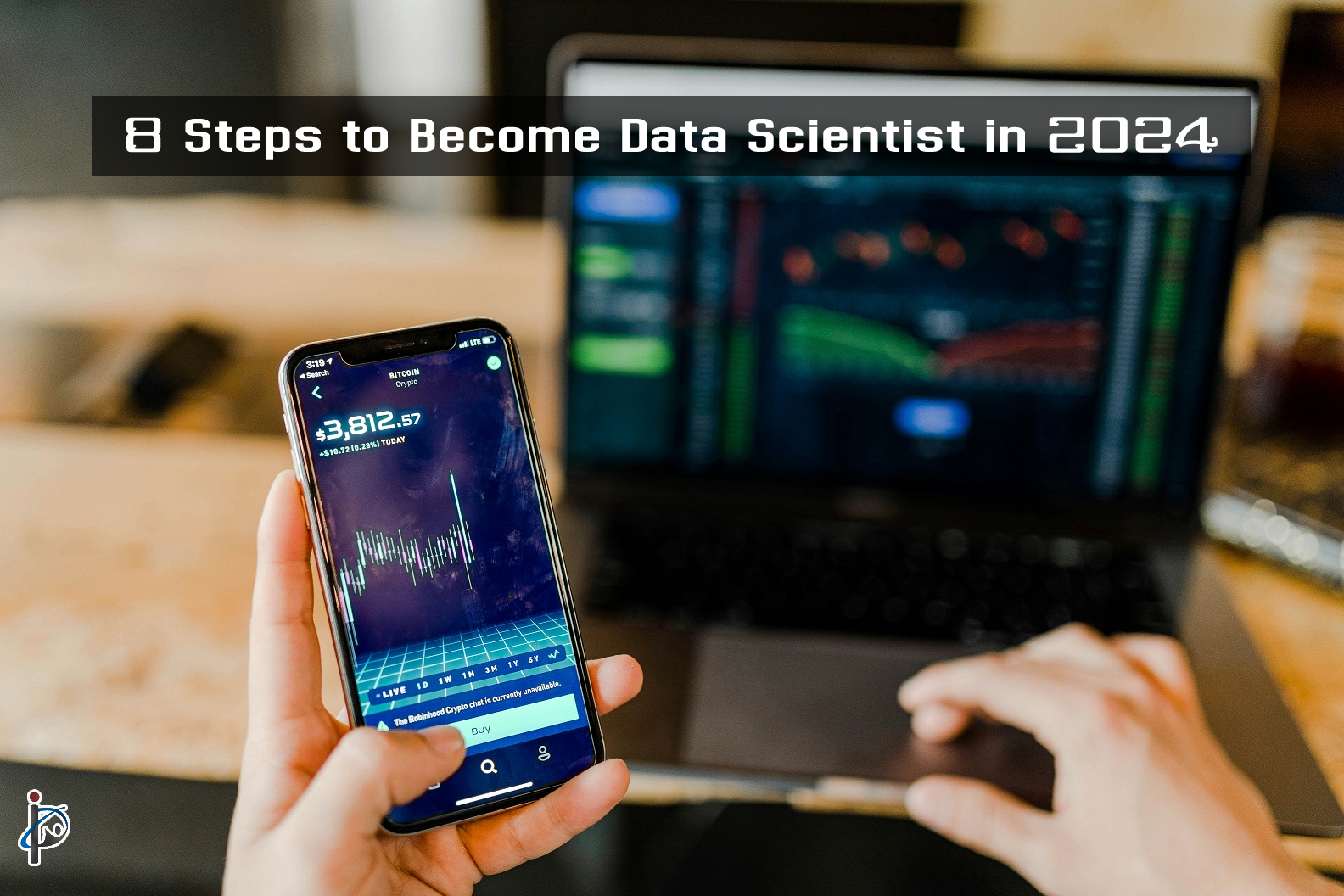
Nowadays, data science is pervasive. Businesses all over the world are using data science one after another to address a wide range of issues. Data scientists are now in a favourable position about employment and compensation because of this circumstance.
More and more people are interested in finding out how to work as data scientists. You might be one of those people if you're reading this article. Everything you require to become a data scientist will be covered here. Along with a convenient and worthwhile method of acquiring the knowledge and skills required to get started in the field. Database scientists are among the top analytics careers that we have selected. Our article contains information on other positions as well.
What Is the Work of a Data Scientist?
An entire article is devoted to comprehending data science. We discuss the potential roles of data scientists there. In essence, data scientists strive to produce insights that can be put to use by thoroughly understanding and analysing data.
They collaborate with various teams in a business setting to establish the groundwork for reliable analytics. This entails creating plans to collect, compile, and purify data from various sources. They can develop solutions and share their findings with the larger company after arranging and analysing this data.
Professionals such as data engineers, analysts, IT architects, application developers, and business stakeholders are frequently collaborated with by data scientists. Several job boards post jobs related to this field that one can apply for.
What Credentials Are Required of Data Scientists?
The question of whether a degree is required to work as a data scientist is up for debate. Although many professionals have entered the field in other ways, having a university degree can undoubtedly be helpful.
The majority of graduate programs seek candidates with backgrounds in computer science, data science, statistics, mathematics, engineering, and even physics. However, some programs will teach any degree-holding individual how to become a data scientist.
Although specific skills will be covered in more detail later on. It can be beneficial to have a basic understanding of Python, R, SQL, and/or Julia.
For others, the means of self-directed learning will suffice to acquire the requisite skills and experience on their schedule. This also makes an impression on potential employers during the interview phase. For example, you can acquire all the skills required to begin a career in data science by enrolling in a course.
Additionally, you can demonstrate your expertise in data science to prospective employers by earning a certification in the field. The database scientist's salary is also amazing compared to other professions.
How Can Someone Get Into Data Science?
You're probably excited to begin your path toward becoming a data scientist by this point. But where should one begin? We've outlined the eight steps you must take to become a data scientist from scratch below.
The precise requirements for a data scientist will vary depending on many factors. As we have already discussed, these are some of the steps that are most frequently mentioned:
1. Gain Knowledge of Reporting, Data Visualization, and Data Wrangling
You'll come across big, complicated datasets frequently as you pursue a career in data science. You'll need to learn how to deal with this information to make sense of it (for both yourself and others). This is where data wrangling expertise is useful. Here's where you'll tidy, arrange, and format unprocessed data so you can examine it and make inferences.
While there are many tools available for data wrangling, Python libraries such as pandas are frequently the preferred option. For more information, see our cheat sheet on data wrangling in Python using pandas.
You must become an expert in reporting and data visualization if you want to present your data in an impactful way. You can learn more about some of the top data visualization tools available. You will get a variety of choices based on your end objective.
2. Improve Your Knowledge of Math, Statistics, and Machine Learning
Although a degree in these subjects is not always required, you do need to have some practical understanding of them. In general, you should study topics like statistics, linear algebra, and calculus. It's important to consider your motivations for learning these things, though.
Although there are functions in both Python and R that can handle the calculus for you, learning calculus can help you create optimization algorithms for machine learning. For instance, knowing about gradient descent can make it easier to gauge how changes in inputs affect a function's output. This in turn helps improve machine learning models.
The Linear Algebra for Data Science in R course will help you sharpen your linear algebra skills. These courses assist you in working with vectors and matrices, solving matrix-vector equations, performing eigenvalue/eigenvector analyses and a lot more. All of these fields are beneficial to data science and applied mathematics.
Similar to this, Intermediate Statistical Modelling in R helps you advance in important areas. It covers some of the fundamental topics in machine learning statistics.
3. Acquire coding knowledge
We go into great detail about some of the best programming languages you should think about learning right now. Given their ubiquity and versatility, R and Python are two of the most obvious choices for data scientists.
Data science SQL is yet another crucial programming language since, naturally, working with data also entails working with databases. Luckily, after you've studied R and Python, it's a fairly simple language.
Julia is a viable option after you've studied SQL, R, and Python. Julia is a fast, intuitive language that was designed from the ground up for data science. These four will work just fine until you start working with very large data sets. You might need to learn other languages before then.
An open-source language with a reputation for performance and efficiency is Java. Java Virtual Machines offer a reliable and effective foundation for big data tools like Spark, in this field.
Scala, C/C++, JavaScript, and SAS are additional coding languages that are valuable to learn for data science.
4. Recognize Databases
It's important to reiterate the point we made about SQL in the previous section. Data scientists can quickly and effectively store structured data thanks to relational databases. SQL is frequently the best tool for gathering and organizing data in this situation.
In addition to handling structured data, SQL enables you to query databases and organize, prepare, and experiment with data. Additionally, SQL is frequently used in conjunction with Python, and libraries like SQLite, PostgreSQL, and MySQL. These facilitate the connection of various data sources.
5. Acquire Proficiency Using Big Data
As we've already mentioned in passing, working with big data sets is a common task for data scientists. These data sets are growing larger in an era where everything and everyone is producing more data than ever before. This makes them more difficult to gather, manage, and process.
However, a trained data scientist can glean new and in-depth insights from these massive data sets. Thus, becoming proficient with cloud computing platforms like Google Cloud can help you advance in your data science career. Similar to this, big data processing, analysis, and machine learning can be aided by tools like Apache Spark.
6. Meet Other Data Scientists and Gain Experience and Practice
You'll need as much experience and practice as you can to become a data scientist. Fortunately, there are lots of opportunities to work on projects, participate in communities, and advance your data science knowledge.
Example, a few online courses workspace offers a cloud-based collaborative notebook where you can share insights, work together, and analyse data. Workspace is made to help you go from learning data science to applying it. Additionally, it comes with pre-built datasets, so you can begin data analysis right away.
Your skills can also be put to use in a variety of data science projects. This will enable you to use your browser to solve practical issues.
7. Look for a Job or Apply for an Internship
After you've honed all of the aforementioned abilities, you should start using them in more formal contexts. You can start applying for internships if you have gained the skills.
Check out our comprehensive guide on how to differentiate yourself from other applicants when applying for data science jobs. In addition to having a fairly comprehensive portfolio that showcases your range of abilities, you should get ready for the data scientist interview in advance.
8. Participate In and Follow the Community
You'll need to stay current with a rapidly evolving field if you want to work as a data scientist. Interacting with what is frequently a kind and committed community. This is the best way to stay up to date on advances in data science.
You can follow data science leaders on various blogs, niche websites, and social media platforms like Reddit, LinkedIn, Facebook etc. Seek out individuals who share your interests, ask for guidance, participate in conversations, and stay up to date on events. Of course, for industry news from a variety of data professionals, check out the DataFramed Podcast.
Final Thoughts
Becoming a data scientist is a rewarding and exciting career path. A data scientist's role is more important than ever because data science is influencing every industry and sector. A career in data science offers countless opportunities, regardless of your motivations: the desire to make significant decisions using data, the prospect of a large salary, or your insatiable curiosity.
There are many ways to get into this exciting field, as we've covered in this extensive guide. The path can be customized to meet your needs and preferences. This can range from formal education in computer science or statistics to self-directed learning through online courses, tracks, and certifications.
Data scientists are in high demand, and further expansion is anticipated in the upcoming years. This expansion is seen in the range of roles and specializations available within the field. There's a niche for you whether you want to work with data, as a machine learning engineer or analyst.
There has never been a better moment to pursue a career in data science if you're analytical, like solving problems. With our Python-based Data Scientist career track, get started right now.








ADD COMMENT